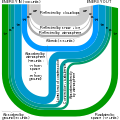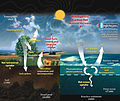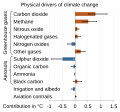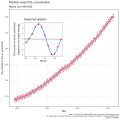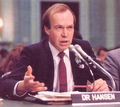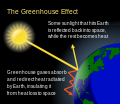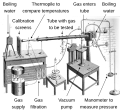Portal:Climate change
The Climate Change Portal Present-day climate change includes both global warming—the ongoing increase in global average temperature—and its wider effects on Earth's climate system. Climate change in a broader sense also includes previous long-term changes to Earth's climate. The current rise in global temperatures is driven by human activities, especially fossil fuel burning since the Industrial Revolution. Fossil fuel use, deforestation, and some agricultural and industrial practices release greenhouse gases. These gases absorb some of the heat that the Earth radiates after it warms from sunlight, warming the lower atmosphere. Carbon dioxide, the primary gas driving global warming, has increased in concentration by about 50% since the pre-industrial era to levels not seen for millions of years. Climate change has an increasingly large impact on the environment. Deserts are expanding, while heat waves and wildfires are becoming more common. Amplified warming in the Arctic has contributed to thawing permafrost, retreat of glaciers and sea ice decline. Higher temperatures are also causing more intense storms, droughts, and other weather extremes. Rapid environmental change in mountains, coral reefs, and the Arctic is forcing many species to relocate or become extinct. Even if efforts to minimize future warming are successful, some effects will continue for centuries. These include ocean heating, ocean acidification and sea level rise. Climate change threatens people with increased flooding, extreme heat, increased food and water scarcity, more disease, and economic loss. Human migration and conflict can also be a result. The World Health Organization calls climate change one of the biggest threats to global health in the 21st century. Societies and ecosystems will experience more severe risks without action to limit warming. Adapting to climate change through efforts like flood control measures or drought-resistant crops partially reduces climate change risks, although some limits to adaptation have already been reached. Poorer communities are responsible for a small share of global emissions, yet have the least ability to adapt and are most vulnerable to climate change. Many climate change impacts have been observed in the first decades of the 21st century, with 2024 the warmest on record at +1.60 °C (2.88 °F) since regular tracking began in 1850. Additional warming will increase these impacts and can trigger tipping points, such as melting all of the Greenland ice sheet. Under the 2015 Paris Agreement, nations collectively agreed to keep warming "well under 2 °C". However, with pledges made under the Agreement, global warming would still reach about 2.8 °C (5.0 °F) by the end of the century. Limiting warming to 1.5 °C would require halving emissions by 2030 and achieving net-zero emissions by 2050. There is widespread support for climate action worldwide. Fossil fuel use can be phased out by conserving energy and switching to energy sources that do not produce significant carbon pollution. These energy sources include wind, solar, hydro, and nuclear power. Cleanly generated electricity can replace fossil fuels for powering transportation, heating buildings, and running industrial processes. Carbon can also be removed from the atmosphere, for instance by increasing forest cover and farming with methods that capture carbon in soil. (Full article...) Selected article – There is a nearly unanimous scientific consensus that the Earth has been consistently warming since the start of the Industrial Revolution, that the rate of recent warming is largely unprecedented, and that this warming is mainly the result of a rapid increase in atmospheric carbon dioxide (CO2) caused by human activities. The human activities causing this warming include fossil fuel combustion, cement production, and land use changes such as deforestation, with a significant supporting role from the other greenhouse gases such as methane and nitrous oxide. This human role in climate change is considered "unequivocal" and "incontrovertible". Nearly all actively publishing climate scientists say humans are causing climate change. Surveys of the scientific literature are another way to measure scientific consensus. A 2019 review of scientific papers found the consensus on the cause of climate change to be at 100%, and a 2021 study concluded that over 99% of scientific papers agree on the human cause of climate change. The small percentage of papers that disagreed with the consensus often contained errors or could not be replicated. The evidence for global warming due to human influence has been recognized by the national science academies of all the major industrialized countries. In the scientific literature, there is a very strong consensus that global surface temperatures have increased in recent decades and that the trend is caused by human-induced emissions of greenhouse gases. No scientific body of national or international standing disagrees with this view. A few organizations with members in extractive industries hold non-committal positions, and some have tried to persuade the public that climate change is not happening, or if the climate is changing it is not because of human influence, attempting to sow doubt in the scientific consensus. (Full article...) Selected picture –An image of the collapsing Larsen B Ice Shelf and a comparison of this to the U.S. state of Rhode Island.
WikiProjectsIn the newsAdditional News
Selected biography –Karen Christiana Figueres Olsen (born 7 August 1956) is a Costa Rican diplomat who has led national, international and multilateral policy negotiations. She was appointed Executive Secretary of the UN Framework Convention on Climate Change (UNFCCC) in July 2010, six months after the failed COP15 in Copenhagen. During the next six years she worked to rebuild the global climate change negotiating process, leading to the 2015 Paris Agreement, widely recognized as a historic achievement. Over the years Figueres has worked in the fields of climate change, technical and financial cooperation, energy, land use and sustainable development. In 2016, she was Costa Rica's candidate for the United Nations Secretary General and was an early frontrunner, but decided to withdraw after garnering insufficient support. She is a founder of the Global Optimism group, co-author of The Future We Choose: Surviving the Climate Crisis (2020) along with Tom Rivett-Carnac, and co-host of the popular podcast Outrage and Optimism. (Full article...) General imagesThe following are images from various climate-related articles on Wikipedia.
Did you know –Related portalsSelected panorama –A view of Sand Mountain campground from the side of Sand Mountain at Little Sahara Recreation Area in Utah. The Little Sahara sand dunes are remnants of a large river delta formed by the Sevier River from about 12,500 to 20,000 years ago. The river emptied into ancient Lake Bonneville near the present day mouth of Leamington Canyon. After Lake Bonneville receded, winds transported the sand from the river delta to the current location. The dunes are still moving 5 to 9 feet (1.5 to 3 m) per year. The area is home to typical Great Basin desert wildlife including mule deer, pronghorn antelope, snakes, lizards and birds of prey. Great horned owls make their home among juniper trees in the Rockwell Natural Area.
Topics
CategoriesWeb resources
Things to do
WikimediaReferences
Discover Wikipedia using portals
|







